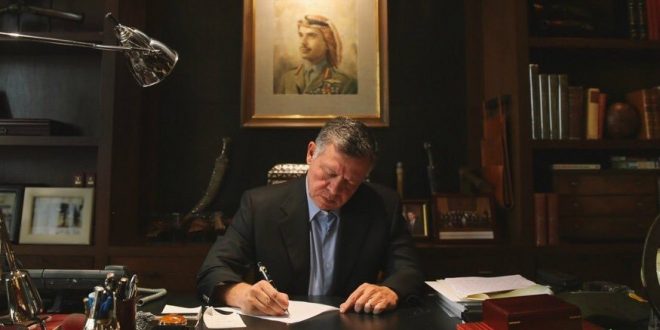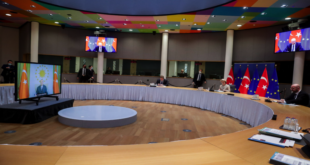By: King of Jordan Abdullah II ibn Al Hussein (*)
In my previous five discussion papers, I put forward several ideas and visions related to Jordan’s political reform path. These included advancing crucial democratic practices, identifying the roles of stakeholders in the political process and articulating the ultimate end goal for reform efforts — achieving an envisioned level of democratic participation necessary to secure young generations with a promising future of prosperity and stability.
Since the last discussion paper, many developments have taken place. Conflicts have deepened and our region is undergoing radical transformations, triggering grave repercussions on regional countries, including our beloved country.
It is perhaps not an overstatement to say that no single country in recent history has endured as many external shocks as Jordan has. Despite conflicts and wars surrounding us, disintegration of neighbouring societies, and the influx of refugees seeking the safety and dignity they were denied in their homeland. Despite all odds and challenges, we have proved to ourselves and the entire world – time and again – that we stand tall, strong and resolute in our unity.
As I see how generous and giving our country is, I find myself deeply touched by the kindness of Jordanians and so proud of your determination and patriotism. I know that each and every one of you, no matter how your perspectives may differ, will find at least a small place of pride in your hearts for our beloved Jordan.
Those of you living abroad will have experienced firsthand the tremendous respect and admiration the world has for our country – with all that it represents and all that it stands for.
Today, we are at a critical crossroads surrounded with challenges. We must determine our path carefully, fully aware of the challenges at hand, and chart our way forward towards our future with a clear vision to achieve our ambitions and pass onto generations a legacy of peace, security, prosperity, dignity and the strength to overcome the most difficult challenges.
But for us to remain resilient in the face of present challenges and to progress and prosper into the future, there is one aspect that I would like to focus on today. To me it is the main underpinning of a properly functioning nation. It is the one factor that differentiates between a ‘developed’ and ‘developing’ nation. It is the very foundation upon which successful democracies, prosperous economies, and well-functioning societies are built. It is the guarantor of individual and public rights, provider of the framework for effective administration, the architecture for a safe and fair society and the accelerator for growth and prosperity. I am referring, of course, to the rule of law. Respecting rule of law is the one true expression of love for our country. Declarations of loyalty and devotion to Jordan remain abstract and theoretical in the absence of respect to laws.
The state is responsible for upholding the rule of law with justice, equality and integrity. On the other hand, citizens are responsible for observing laws in their daily lives. I say this because experience has taught me that individuals accept and embrace the rule of law in principle, while in practice, some believe they are the “exception” and excused from applying it.
Rule of law cannot be applied selectively and it supersedes social status, rank and family connections. I feel so disheartened and outraged when I learn that a young girl has died in the arms of her father because of festive firing in weddings or celebrations, or when a mother loses her son in a car accident because of a reckless driver, or when an excellent student loses an opportunity he has every right to, or when a criminal enjoys freedom without accountability. All of this happens when rule of law is not upheld. These are examples which we all know and can relate to, they touch the essence of our rights and they sow division amongst us.
As I look at the harrowing and saddening state of many of the nations in our region, I see clearly that the absence of rule of law and its fair application was a major factor that contributed to the situation today.
Our region is a made up of a complex matrix of diverse religious, racial, ethnic, sectarian and tribal constituents. This diversity can lead to social and cultural enrichment, political pluralism, and economic enhancement or it can foment nationalism, ethnic conflict or even war. The dividing line between these two realities is demarcated by the presence or absence of rule of law.
Respect for the rights of minority groups should be viewed as a guarantor for the rights of the majority. If any member of our society feels unsafe or unfairly treated because he or she belongs to a minority, then all of us must feel that we are standing on shaky grounds. All our citizens have inalienable rights that must be safeguarded. The rule of law is the main underwriter of these rights and it is, therefore, the most effective enforcer of social justice.
I have great regard to what we are today but have even greater ambitions for what we can become. But not one of my dreams for our nation can be realised in the absence of rule of law. I see it as the foundation that grounds us, the pillar that holds us and the bridge that can carry us to a better future.
And I ask every citizen to show respect for our beloved country by respecting its laws, express love to our country by extolling its laws, show loyalty to our country by never acting above the law, and to pledge that respect for rule of law will be the essence of our individual and collective actions.
Rule of law: the essence of prudent state administration
As I have said, every citizen, official and state institution must fulfil the duty of protecting and enhancing the rule of law, which is the essence of a prudent administration that adopts justice and equality as the pillars of its approach.
We cannot achieve sustainable development, empower our creative youth or successfully execute our development plans unless we develop state administration and enhance the rule of law through strengthening the principles of justice, equality and transparency. These noble principles are the basis of the Great Arab Awakening and Revolt and this year we celebrate its centennial anniversary.
Political reform can only yield its fruits when an effective and clear approach for realising the rule of law is in place. Moreover, the positive steps achieved on the path of political reform, starting with the constitutional amendments of 2011 and the ensuing legislation regulating political life – namely, elections and decentralisation laws – must be coupled with profound and drastic administrative reforms aimed to enhance the rule of law, advance administration and modernise procedures. These steps should pave the way for administrative leadership capable of delivering and leading change so that a new and competent echelon can take over administrative posts, equipped with the needed vision and abilities to serve citizens with dedication.
Here, it is worth noting the efforts of the government and various institutions seeking to ensure a prudent administration of the state. Indeed, there have been national and inclusive endeavours towards this goal, namely the formation of the National Integrity Committee, which resulted in the National Integrity Charter and its Executive Plan detailing responsibilities and timeframes. A Royal Committee was consequently formed and tasked with the follow-up and evaluation of the national integrity system, it recommended establishing a new Integrity and Anti-Corruption Commission, incorporating under its umbrella the previous Anti-Corruption Commission and Ombudsman Bureau, in an effort to streamline and boost efforts as well as advance transparency and justice.
During recent years, however, the level of performance and achievement in administrative agencies has not met our expectations and has not been up to what the public deserves. All state institutions must, therefore, join efforts to improve administration processes and cement the rule of law. This requires adopting a process of regular evaluation and advancement of individuals and institutions to achieve the highest performance levels we aspire to.
Rule of law is meant to ensure that principles of justice, equality, transparency and accountability are upheld by all state institutions and community members, with no exception, especially officials in leading positions. This needs to be translated into practices on the ground as there is not a single administration that can continue with its reform efforts and enhance its performance without adopting rule of law as a constant approach and key pillar in its work.
Accepting the rule of law is an essential requirement for a successful democratic transformation. No democracy that respects human rights can work outside this framework. Accordingly, all government and other state agencies share accountability for decisions, policies and measures they take. Parliament exercises its legislative and oversight role, while the independent and impartial judiciary and security agencies are tasked with applying the law in a manner that assures citizens that they and their families are protected by laws that are applied with no discrimination. And the law has to be fully applied on officials as it is applied on private citizens. Laws, moreover, should be based on transparent and clear legislation and the law enforcement process should be managed prudently and efficiently.
Hesitation in applying the law in a just, transparent and competent manner leads to the loss of rights and weakens people’s trust in state institutions. Leniency by some officials in upholding the law and safeguarding the principles of integrity, transparency, justice and equality encourage some to continue violating the law, creating room for corruption, and even undermining the country’s most vital pillar – good citizenship.
Developing government administration is an ongoing process that requires constant review and evaluation. Flaws and shortcomings must, therefore, be identified in order to be addressed.
The principles of accountability and responsibility must be carved in as a core value in our national institutions to be well observed by all levels in government administration. Public servants should be held accountable for underperformance or negligence.
A well-functioning system of accountability has prerequisites, foremost of which is that our institutions adopt binding codes of conduct that govern the work and performance of institutions and authorities. Our national institutions should also formulate a clear vision, action plans and goals. This will allow state institutions to achieve their goals and measure progress and seek the highest standards of integrity and transparency, as well as best quality of services provided to citizens.
Ensuring that the rule of law is upheld requires effective oversight mechanisms. These include internal audit units functioning within ministries and institutions, the Audit Bureau and Integrity and Anti-Corruption Commission, along with Parliament, which has a constitutional oversight role. These units and institutions should put the interests of the country and citizens first and foremost, while the judiciary looks into appeals and complaints against administrative decisions and corruption cases.
These mechanisms combined, along with the Constitutional Court and the Independent Election Commission, play a vital role in cementing rule of law. They must be continuously developed through advanced tools that ensure efficiency and promptness. Performance shortcomings must be addressed on the legislative and technical levels to ensure citizens’ trust in state institutions and prevent anyone from undermining the rule of law.
Wasta and nepotism
We cannot address the issue of rule of law without recognising that wasta and nepotism jeopardise development efforts. Wasta does not only impede the country’s progression, it erodes achievements by undermining the values of justice, equal opportunity and good citizenship, which are the enablers of development in any society.
We cannot tolerate such practices that destroy the bases of public service. We cannot allow them to become a source of frustration for our qualified youth, by leaving our young generations victim to the conviction that their future, whether in college or in the job market, hinges on their ability to benefit from wasta and nepotism. How can a generation brainwashed with sub-loyalties assume the responsibilities of protecting rule of law or running national institutions?
This challenge warrants a comprehensive national strategy on youth, devising programmes designed by experts and prominent institutions with the aim of cementing values of good citizenship, the state of law and love of the country. These programmes should also empower young people to realise their potential and expand their horizons and immune them against extremist evil ideologies.
Senior government appointments surface as a topic and dominate the conversation, whenever wasta and nepotism are addressed. We have, regrettably, seen in recent years some transgressions that burdened our institutions and citizens with unqualified officials. These practices have deprived institutions from qualified personnel and leadership that can advance these agencies and serve the country and the people. It should be emphasised here that meritocracy should be the only basis for appointment.
Advancing the judiciary and enhancing rule of law
Rule of law cannot be upheld unless a qualified, impartial and efficient judicial apparatus is in place.
Citizens resort to the judiciary because they have confidence in its ability to deliver them justice and safeguard their rights as swiftly as possible. If we lose that, people’s confidence in the judicial system will be shaken.
Jordan has always been renowned for its qualified judicial apparatus. We often pay tribute to judges who are well remembered and revered for their contributions to the advancement of our well respected judiciary. However, litigation can often be lengthy and there is a shortage in personnel and in certain judicial specialties. These challenges, inter alia, adversely affect the performance of the apparatus and the rights of citizens and investors.
Accordingly, it has become imperative to formulate a clear strategy on judicial reform for the coming years to reform and develop the judicial institution and supporting agencies. Such a strategy is expected to help enhance the judicial environment to increase its integrity and effectiveness and contribute to the creation of the modern institution that our judiciary is worthy of. Experts and specialised judicial staff should be prepared and policies and legislation should be in place to expedite litigation and simplify procedures. Efforts should also be exerted to instil the culture of integrity in the judicial apparatus at all stages and activate the judicial code of conduct.
The criteria for appointing, promoting and transferring judges should be developed to ensure that meritocracy and qualifications are applied and justice and transparency are upheld. It is similarly essential to enhance the capabilities of judges and make certain they acquire the necessary skills to produce sound judicial rulings. In parallel to that, there is a need to develop, modernise and empower judicial oversight and inspection departments, ensuring that inspection reports provide an accurate and credible tool to measure the performance of judges and evaluate their conduct.
Rule of law: the sine qua non of civil state
The term “civil state” has been actively debated recently. Some even contested the concept, which seems to be the result of confusion and lack of understanding of what it really stands for.
A civil state is one that is governed by a constitution and laws that apply to all citizens without exception. It is a state of institutions that guarantee separation of powers through a system of checks and balances, preventing any power from encroaching on the other. It is a state built on peace, tolerance and harmony and is distinguished for respecting and safeguarding pluralism, respecting different opinions and protecting all members of the community, regardless of their religious or intellectual affiliation. It is a state that protects rights and guarantees freedoms, where all are equal in their rights and obligations. It is a state to which citizens resort when their rights are violated. It guarantees religious freedom for its citizens and enroots tolerance and respect of others in society. It protects the rights of women and minorities.
These principles constitute the essence of a civil state. This is not synonymous with a secular state. In a civil state, religion is a key contributor to the value system and social norms. Religion is also enshrined in our constitution. However, we will not allow anyone to manipulate religion to serve political interests or gains for a specific faction.
In the conducts of Prophet Mohammad, peace be upon him, we find a great inspiring example in the Medina Charter after he migrated from Mecca to Medina, with the aim of regulating the relationship between all sects and groups in the city, including Muslims from Mecca (muhajirin) and Medina (ansar) as well as Jews. Many observers consider such a pact a unique and early civil charter in history that is a landmark achievement for the Islamic state and a milestone in its political legacy. It was based on the principle of citizenship in terms of rights and obligations and placed them all under the protection of the state in return for defending it.
The Charter comprised several aspects, including coexistence between all community members in Medina and ensuring social safety for all, equality between the residents of the city as full citizens and active contributors to various domains of public life. It established respect and protection of religious freedom and worship, social solidarity, protecting non-Muslim citizens and non-Muslim minorities as well as exchanging counsel and acts of charity among Muslims, people of monotheistic faiths and others.
In summary, the civil state is one that upholds rule of law and is governed by a constitution and laws. It is a state that endorses active citizenship, pluralism and difference in opinions. It is a state where citizens have equal rights and duties, without any discrimination based on religion, language, colour, gender, race, class, political affiliation or intellectual views.
We remain fully committed to the values that define us as a nation and people: values of peace, moderation, compassion, solidarity, pluralism, acceptance of others, perseverance, openness and good citizenship. Those values are what truly means to be a Jordanian. They are inseparable from our heritage and we will continue to instil them in our young generations.
______________________________________________________________________
(*) This article was originally published on King Abdullah II official website . Read the original article. The views expressed in this article belong to the author and do not necessarily represent ForMENA
 ForMENA Council for MENA affairs
ForMENA Council for MENA affairs



